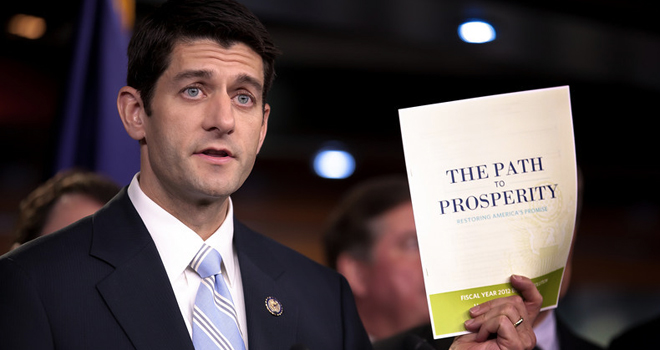Rep. Paul Ryan (R-WI) just broke a land speed record for his pivot from decrying Democratic “Mediscare” attacks on the GOP budget to attacking Democrats for wanting to end “Medicare as we know it.”
In an interview with WISN, a local ABC News Affiliate in Wisconsin, Ryan responded to the fact that his budget, endorsed by almost every member of the Republican party, is extremely unpopular.
“Whenever you lead and propose a solution to a complex problem, you’re putting yourself out there to be distorted, to be demagogued to be lied about,” Ryan said. “What’s happening is the other party’s chosen to try to scare senior citizens to try and get votes. Here’s the deal on our Medicare plan: ObamaCare ends Medicare as we know it.”
Ryan cites the fact that the health care law cuts $500 billion from Medicare over 10 years (largely overpayments to private insurers participating in Medicare Advantage) and creates a new panel — the IPAB — to establish money-saving payment practices for the program, to argue that it “ends Medicare.”
Ryan’s plan actually sustains those $500 billion in cuts, while repealing just about all other parts of the health care law. Far beyond that, though, his plan would close the door on traditional Medicare in 10 years, and phase it out by putting new retirees in a private, subsidized health insurance market. As usual, though, privatizing a major entitlement polls really poorly, and Republicans are facing huge voter backlash in their districts after voting to endorse Ryan’s plan.
“Those polls don’t describe it very well. When the plan is described accurately, it actually polls very well,” Ryan claims. The fact is, very few polls, even ones at pains to describe his plan in a value-neutral way, find much support for it. But even if Ryan had the best of that argument, he’s starting to sound an awful lot like Democrats in 2010, who argued persistently that their unpopular health care law polled well when explained well, and contained individual measures that were overwhelmingly popular. This was basically correct, and the result was a historic creaming in the November midterms.










